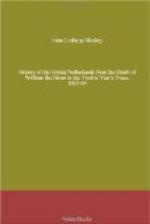The cautionary towns being next mentioned, Barneveld stated that a demand had been made upon Envoy Caron by Cecil for the delivery of those places to the English Government, as England had resolved to make peace with Spain.
The Advocate confided, however, to De Rosny that the States would interpose difficulties, and that it would be long before the towns were delivered. This important information was given under the seal of strictest secrecy, and was coupled with an inference that a war between the republic and Britain would be the probable result, in which case the States relied upon the alliance with France. The ambassador replied that in this untoward event the republic would have the sympathy of his royal master, but that it would be out of the question for him to go to war with Spain and England at the same time.
On the same afternoon there was a conference at Arundel House between the Dutch deputies, the English counsellors, and De Rosny, when Barneveld drew a most dismal picture of the situation; taking the ground that now or never was the time for driving the Spaniards entirely out of the Netherlands. Cecil said in a general way that his Majesty felt a deep interest in the cause of the provinces, and the French ambassador summoned the Advocate, now that he was assured of the sympathy of two great kings, to furnish some plan by which that sympathy might be turned to account. Barneveld, thinking figures more eloquent than rhetoric, replied that the States, besides garrisons, had fifteen thousand infantry and three thousand cavalry in the field, and fifty warships in commission, with artillery and munitions in proportion, and that it would be advisable for France and England to furnish an equal force, military and naval, to the common cause.
De Rosny smiled at the extravagance of the proposition. Cecil, again taking refuge in commonplaces, observed that his master was disposed to keep the peace with all his neighbours, but that, having due regard to the circumstances, he was willing to draw a line between the wishes of the States and his own, and would grant them a certain amount of succour underhand.
Thereupon the Dutch deputies withdrew to confer. De Rosny, who had no faith in Cecil’s sincerity—the suggestion being essentially the one which he had himself desired—went meantime a little deeper into the subject, and soon found that England, according to the Secretary of State, had no idea of ruining herself for the sake of the provinces, or of entering into any positive engagements in their behalf. In case Spain should make a direct attack upon the two kings who were to constitute themselves protectors of Dutch liberty, it might be necessary to take up arms. The admission was on the whole superfluous, it not being probable that Britain, even under a Stuart, would be converted to the doctrine of non-resistance. Yet in this case it was suggested by Cecil that the chief reliance of his Government would be on the debts owed by the Dutch and French respectively, which would then be forthwith collected.




